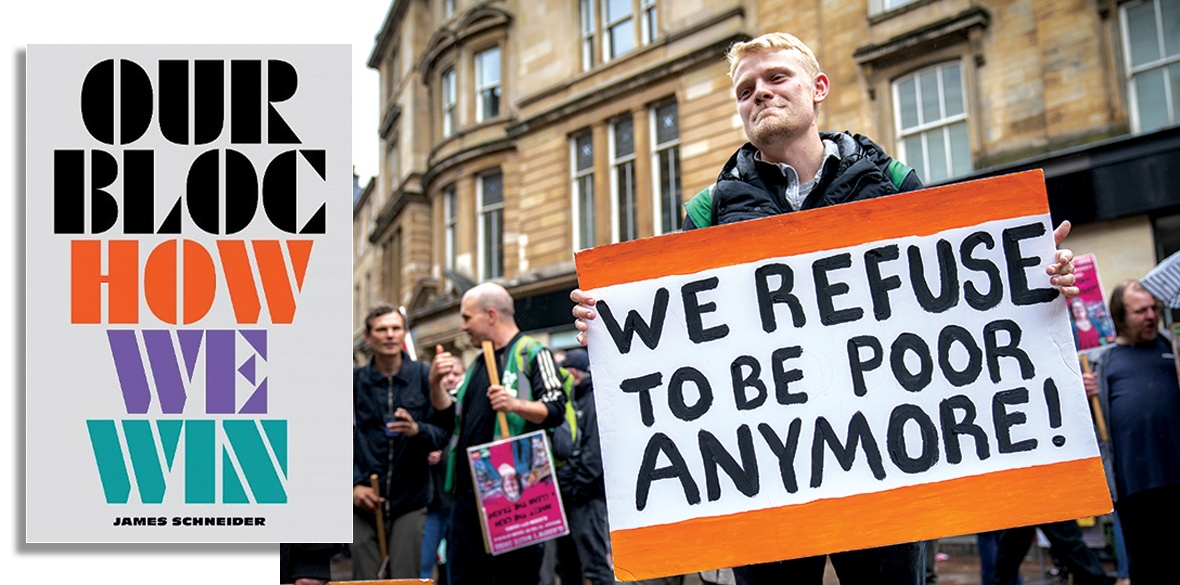This is the last article you can read this month
You can read more article this month
You can read more articles this month
Sorry your limit is up for this month
Reset on:
Please help support the Morning Star by subscribing here
Our Bloc — How We Win
James Schneider
Verso, £8.99
JAMES SCHNEIDER has done the movement a favour with this brisk, optimistic and ambitious primer on left strategy.
Our Bloc — How We Win takes its place among the analyses of Corbynism being written by key players in that drama — Schneider, a co-founder of Momentum and Jeremy Corbyn’s head of strategic communications, was certainly one of those.
But it is no post-mortem. The “history” section on the rise and fall of Corbyn himself is covered in nine pages of Chapter 1, The First Surge. Schneider focuses on the fact that a powerful left was built in this phase rather than its 2019 defeat: “The Corbyn movement may feel orphaned, but it is not an infant. It can succeed if it proves its maturity through tolerance for diversity, internal generosity and commitment to the long haul.”
His reasons to be cheerful? “The hegemony of Westminster’s Tweedledum and Tweedledee is more apparent than real.” Schneider is right to point to evidence that public opinion in Britain is way to the left of parliamentary politics.
The class basis for systemic opposition is also there: “Millions of workers ... are locked out of the Thatcherite-New Labour compact of asset-based capitalism.”
The left’s task is to turn a “sociological majority” into a “political majority” for change. That might look a tall order — but the picture looks much bleaker in Parliament than it does across the country.
The biggest strike wave in decades shows a new confidence and militancy among the unions; and the flourishing of direct action organisations shows a widespread willingness to stand up against the system.
Such groups’ tactics may sometimes be divisive, but they have shown an ability to raise the profile of key injustices. Given the Environment Agency now calls for water industry executives to be jailed and the Royal Society for the Protection of Birds has called for a mobilisation of millions against Tory threats to wildlife, building a cross-society consensus against the neoliberal state is not so far fetched as we might think.
Schneider wants the left to think in terms of building a movement: a bloc which will not be built overnight but in “concentric circles” through organisations working together.
He sees Corbyn’s Labour as having been “porous to movements,” a party engaged with and responsive to grassroots pressure.
This is true, though we might point out that it was sometimes too porous – allowing factional pressure campaigns like that for a second referendum to cloud its strategic judgement.
Proposals for a secretariat to manage the “left bloc” seem a long way off for now, but with cost-of-living campaigns and industrial disputes mushrooming, the aim of co-ordination and co-operation is surely right. Schneider is right too to identify the left’s tendency to magnify disagreements and decline to work with other organisations as crippling.
A lot is packed into 100 pages: ideas on how to gather diverse campaigns into “a single line of antagonism” against the system, the way in which struggles around specific demands can change the political weather, the importance of understanding state power as a non-neutral force that must be seized and transformed.
In the process he throws in some novel proposals, like building a collective stake in publicly owned sectors of the economy by buying them up through a “people’s investment fund” that pays out dividends to the public.
There are proposals not just on how to win power but how an elected left government could try to enact lasting reforms. Such a government does not seem imminent, but this is not time wasted. The Corbyn phenomenon took us all by surprise, and it is clear on a range of levels it would have been unprepared for government had it entered office (as it almost did in 2017). The left should be better prepared next time.
He ends with “four futures,” imaginative hypothetical histories of the next 10 years.
Some speculation may be fanciful but the exercise is a useful reminder of our need to be prepared for different eventualities: to consider in advance how we ought to act in various possible scenarios, speeding our ability to mobilise and intervene politically.
Schneider combines close attention to recent political and industrial developments with a theoretical approach leaning on thinkers such as Chantal Mouffe and Ernesto Laclau. Not everyone will like the approach sketched out.
But in viewing the socialist upsurge under Corbyn as the birth of a movement with great potential, this is a valuable corrective to pessimism induced by the crushing defeat of 2019 — and it fizzes with ideas. A great read.










